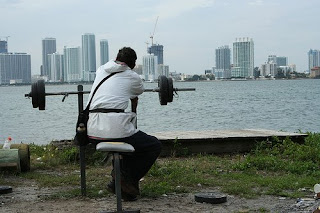
The Miami Herald speaks out. Against residency restrictions. Against buffer zones.
And Ron Book admits he was wrong.
This Frog hopes our Democratic contenders for Florida AG (Dan Gelber, Dave Aronberg and quite possibly, Rod Smith) are listening in and listening well, especially if any or all candidates planned to use the sex offender issue as a vote getter.
Want to be a progressive Democratic candidate? Sit in with Broward County's task force and pay attention to ways Florida's children can be better protected.
Close the sex offenders' camp under causeway
OUR OPINION: The shantytown of sex offenders under the Julia Tuttle Causeway is fast becoming a public-safety and health crisis
The year: 2020. The place: Under the Julia Tuttle Causeway. Population: 500 homeless sex offenders living in a shantytown created with the help of state and local officials. There's an outbreak of tuberculosis in the camp, which the felons leave each day to work.The pollution in the bay has worsened as make-shift toilets flush into the once turquoise waters.
Meanwhile, the courts are still trying to decide if state and local laws went too far.
It may seem like a far-fetched scenario -- 500 men, including a smattering of women, living in tents and rotting wooden cabins under a bridge that links cosmopolitan Miami to tourist mecca Miami Beach. But it's not. Just three years ago -- after the Miami-Dade Commission passed its ordinance barring convicted sex offenders from living within 2,500 feet from schools, parks and even bus stops -- there were only three sex offenders forced to live under the bridge. They could find no affordable housing anywhere else that met the 2,500-foot buffer.
Population swells
Today, there are almost 70 felons.
At that rate, South Florida could find itself with hundreds under the bridge in a few years -- and that includes Broward, where a couple dozen cities have buffers, too. The effort to protect children is fast becoming a public-safety and health crisis -- another pox South Florida does not deserve.
Who's to blame?
• The Florida Legislature, which passed a 1,000-foot-buffer zone several years ago and then allowed cities and counties to go beyond that -- without making a distinction between true sexual predators and offenders who may have been convicted for other, lesser crimes, such as public exposure for urinating outdoors.
• The state Department of Corrections, which has been sending felons with their ankle GPS tracking devices to live on a state-owned spit of sand under the bridge once they finish serving their prison sentences.
• Local governments, which went too far with zones that are unworkable.
Buffer no protection
The American Civil Liberties Union is planning to file a lawsuit. Ronald L. Book, chairman of the Homeless Trust, now admits he was wrong to support the 2,500-foot buffer, and that a smaller buffer would still protect children and find a suitable place for felons to live without becoming a global embarassment for South Florida.
Buffers are wrongly based on the premise that there's a relationship between residency and recidivism. But there's no evidence that's so. The Iowa County Attorneys Association, prosecutors dealing with a 2,000-foot buffer in Des Moines, noted in 2006 that a buffer ''does not provide the protection that was originally intended,'' and that it's too costly to enforce.
The prosecutors noted, too, that most sex crimes against children are committed by relatives -- not strangers in a park.
Children deserve every protection, and loitering restrictions in parks and school zones are one way to keep predators at bay. GPS devices are another way to ensure felons are not straying.
But state and local governments can't continue to dump people under a bridge and pretend this community is safer for it.
Dan, Dave and Rod, one viewpoint offered by a citizen to head you guys in the right direction.
Music wrote on 06/09/2009 12:58:16 PM:The article also points that "GPS devices are another way to ensure felons are not straying". Unfortunately, GPS is not a solution to the problem either. The GPS system as it stands now is pretty ineffective and does not cover the state, there are plenty of "dead zones" where the signal can be lost and also, if an offender wants to remove the GPS bracelet, he/she get some scissors and away they go. Finally, who pays for the GPS if the offender does not have the means to (no job). It falls on the taxpayers.
Let's focus our attention on the repeat and/or violent sex offenders. Those individuals should be on the registry and they should be strictly monitored. Many (not all) of the offenders on the registry are consensual, one time offenders who are little risk to the general public.
If we can focus on the most dangerous offenders and predators, law enforcement can do a more effective job in monitoring and keeping tabs on those who are at the highest risk to re-offend.
And thank you, Miami Herald.